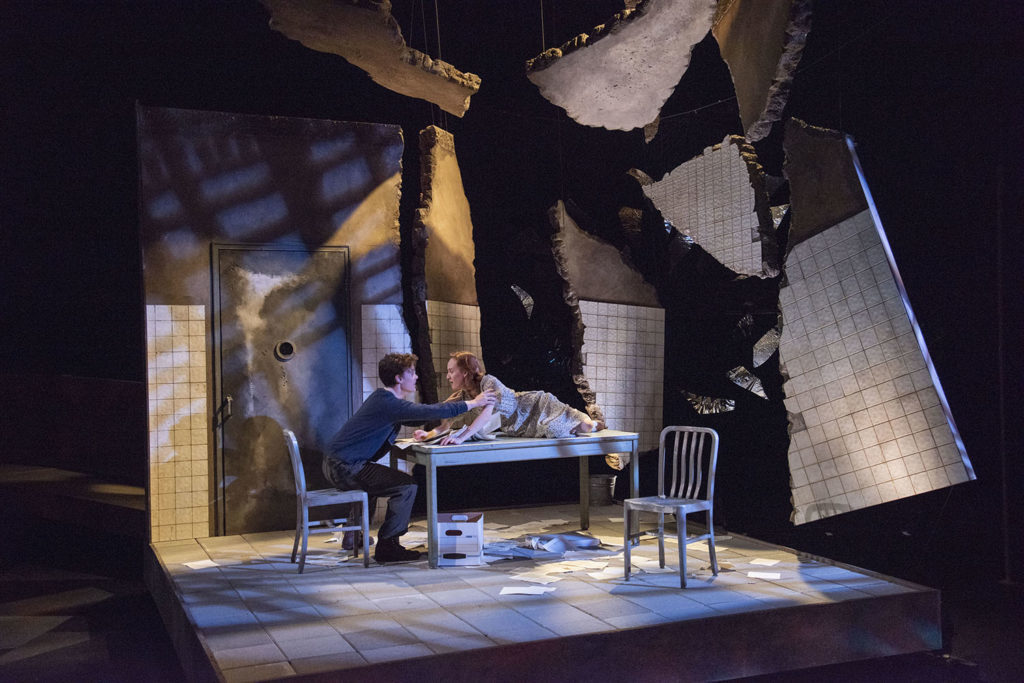
L to R – Conor Proft and Sarah Oakes Muirhead; Photo by Andy Brilliant/Brilliant Pictures.
Presented by New Repertory Theatre
By David Meyers
Directed by Jim Petosa
October 13—November 4, 2018
The Dorothy and Charles Mosesian Center for the Arts
321 Arsenal St
Watertown, MA 02472
New Rep on Facebook
Review by Diana Lu
(Watertown, MA) We Will Not Be Silent revisits the true story of Sophie (Sarah Oakes Muirhead) and Hans (Conor Proft) Scholl, German student dissidents in Nazi Germany executed for attempting to mount a nonviolent resistance movement in 1942. Post-WWII, Germany vindicated the Scholl siblings and lionized their sacrifice as a symbol of great stoicism and bravery.
David Meyers’ script details Sophie’s interrogation before her trial for treason. Detective Kurt Grunwald (Tim Spears) subjects the 21-year old to days of grueling interrogation and torture dotting them with small gestures of kindness. At first, we wonder if this is a trick, if he’s playing good cop/bad cop, baiting her with Hans at her weakest hours. Eventually, the inquisition evolves into a philosophical debate about justice, freedom, morality, and faith, leaving both questioning their convictions.
New Rep’s design was mesmerizing. Sophie’s holding cell was harshly unadorned and lit in grayscale. Two walls backed the stage, one with a doorway, the other floating in pieces, as if frozen in mid-explosion. Oakes Muirhead sat onstage in character as the audience entered, a beautifully discomfiting work of performance art. Each performer was masterful, moving the drama forward with easy charisma. The dreamlike sequences with Hans and Sophie were especially touching in their innocent affection and haunting ambiguity.
I appreciated the moral gray areas explored by this play. Superhero movies have become increasingly popular, and many speculate it is because of their ethical clarity. The hero is unequivocally good, the nemesis cartoonishly bad, and good triumphs every time. In real life, the choice to do what is right comes with extraordinary sacrifice, and we don’t have the hindsight of history to know how things will turn out.
Grunwald and Sophie are both portrayed starkly but sympathetically. Sophie admits she is a white supremacist and anti-Semite, just not to the point of genocide. That is a low bar for a national hero. Grunwald “had mouths to feed”. Likewise, I admired the authentic portrayal of Sophie’s internal conflict—going back and forth, back and forth, the way an anxious mind gnaws an idea before deciding to spit or swallow.
The parallels with current events also hit a nerve. Sophie impugns Grunwald: “Just because you repeat a lie doesn’t make it true,” and “Your generation couldn’t do what we did. You force your children to do the fighting for you.” Those could be direct quotes from the Parkland High shooting survivors.
Further, the Scholls’ rebel outfit, The White Rose, as described by Sophie, is basically White Guilt manifest. The various ways in which Sophie and Grunwald were complicit with the system—and how they tried to alleviate their guilt—is exactly the way liberals talk a big game about social justice but balk when it means giving up their seat at the table or even checking their internal biases.
It’s interesting that none of the characters’ actions amounted to anything. Sophie passed out pamphlets, which were handed in to the Nazis. Grunwald offers her morsels of comfort but can’t save her life. Nor did complicity and concession save Kurt from losing his family. In the end, it is all too little too late and Grunwald is left sitting in the chair that Sophie initially occupied. He cleans his glasses with aching resignation, and the lights fade.
We Will Not Be Silent was a compelling play with an important message, yet ultimately, it felt somewhat shallow and unsatisfying. The focus was on the wrong character. Sophie is nominally the tragic hero, but Grunwald’s moral quandary is infinitely more fascinating and relevant. His character was the one that begged for dissection, and the play never went there.
“Just because I wear this uniform, does not mean I am a monster, Ms. Scholl,” says Grunwald. Yet when he takes off his jacket to reveal his Swastika armband, the theatre fell into a disapproving hush. His evil resides in his choice to wear the uniform, and he doesn’t understand why.
Every time Kurt stepped into Sophie’s cell, the interrogator should have become the interrogated, and each time gotten closer to understanding the true extent of his own depravity.
I wanted Kurt, like Oedipus, to slowly come to the full realization that it is not the intent, but the consequences of his actions that matter, that define who he is. That all the small choices of complicity, concession, and comfort over what he knew was right makes him a monster.
That would have been an epic play. That is the story that needs to be told to Americans today.
The German people created Hitler.
“As long as you weren’t a Communist or a Jew you were fine,” says Grunwald. Americans with the privilege of being bystanders must choose to act, because many, many of us are Communists or Jews or Catholics or Poles or Queer or Disabled or Muslim or Mexican or Black or Immigrant or Femme.
Far more than glorifying retroactive martyrs like Sophie Scholl, who made performative sacrifices all too late in the game, we need to learn how not to become Kurt Grunwald from the very start.
